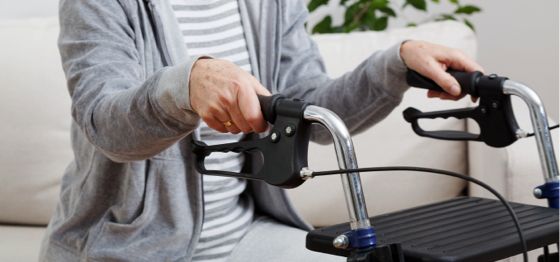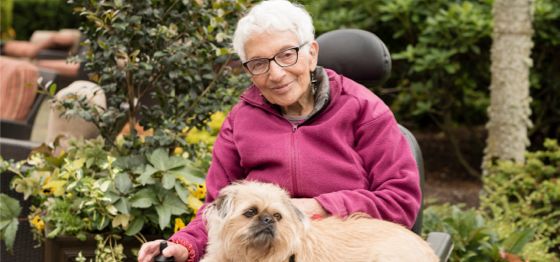According to a recent Consumer Expenditure Survey, housing costs are the biggest expense within the household budgets of adults aged 55+.1 Yet few seniors think about the most appropriate, affordable home setting until someone—a family member or other caregiver—encourages a move, or an accident makes it necessary. 2
“Some people are in such denial and think they can live where they are forever,” says Robyn Golden, Co-Director of the Center for Excellence in Aging and Chair of the Department of Social Work at Rush University Medical Center in Chicago.3
In fact, a recent AARP-sponsored poll from the University of Michigan’s Institute for Healthcare Policy and Innovation found that 88% of Americans ages 50 to 80 want to live in their own homes as long as possible. But only 15% have thought seriously about the home modifications it would take to do it. Plus, just 19% are confident they could afford to hire help for chores or personal care.4
Questions to ask about affordable senior housing5
Even before the COVID-19 pandemic, nearly 10 million older adults were having trouble paying for housing.6 Today, that number may be much higher, due to skyrocketing inflation and ever increasing rents. Fortunately, there are ways to deal with the issue of affordable senior housing.7 Start by asking a few pertinent questions.
- Can older adults get public housing and housing vouchers?
Public housing—ranging from single-family houses to high-rise apartments—can provide eligible low-income seniors a place to call home. Also, housing vouchers (often referred to as Section 8) may help seniors afford a rental not limited to specific housing units.
Seniors may find their local housing authority and determine if they qualify for public housing or a housing voucher. The U.S. Department of Housing and Urban Development (HUD) also maintains a search tool that seniors can use to find a reduced-rent apartment or home in specific areas, as well as landlords who accept Section 8 housing vouchers.
- Should seniors tap into their home equity?
Home equity—the difference between a home’s value and the amount still owed on the mortgage—may give older homeowners workable ways to continue living in their homes affordably.
One option is a home equity line of credit, which works like a credit card. Homeowners can borrow up to a set limit for a set period, such as 10 to 15 years. The homeowner may withdraw money as needed and may be able to pay only the interest on the balance. Once the term is up, both the principal and interest must be paid back within a certain period, such as 10 years, making the monthly payments much higher.8
Similarly, a home equity loan allows the homeowner to take out the money in a lump sum. The loan must be paid back over a set amount of time via fixed monthly payments that include both principal and interest.
“Use Your Home to Stay At Home,” an informative publication from the National Council on Aging, lists some of the pros and cons of taking out a home equity line of credit or home equity loan to help seniors determine what’s right for their individual situations.9
- Is a reverse mortgage good for older adults?
Seniors who own their homes outright, or have only a small mortgage left, might consider a reverse mortgage, a unique type of loan for homeowners aged 62 and older that lets them convert a portion of the equity in their home into cash without having to sell the home or make additional monthly payments. Unlike a home equity loan, a reverse mortgage loan doesn’t need to be repaid until the home is no longer used as a primary residence or the homeowner fails to meet the loan obligations. A reverse mortgage is not right for everyone, however, and should NOT be considered if:10
- The senior homeowner needs immediate financial help.
- The senior owner can’t afford the property taxes or upkeep of the home.
- The senior owner wants to leave the home to a spouse or heirs.
- Can home sharing help seniors afford housing?
Home sharing is a way for seniors who own a home to bring in some extra money and for those looking for an affordable place to live to find a roommate. Seniors interested in home sharing may want to work with a reputable company to help with background screening, roommate matching and leasing.
Senior housing options11
Older adults have several viable options for housing, depending on their individual needs and situations. For seniors who are mostly independent and need little help, these choices may be the solutions they’re looking for:
- Accessory dwelling unit (ADUs). Often called granny flats or mother-in-law suites, these small apartments may be an addition to a family member’s house or a separate home on the property.
- Age-restricted communities. Designed for active seniors aged 55+, these communities may offer swimming pools, pickleball courts and other amenities—plus child-free living.
- Senior apartments. These rental units are typically restricted to people 55 and older and often feature age-friendly features, including limited stairs and grab bars.
- Co-housing. Co-housing communities typically feature attached or semi-detached single-family homes where residents participate in joint activities like cooking and recreation.
In addition, there are several options for seniors who require more help. These include:
- Assisted living. These facilities typically offer residents their own room or suite with access to 24/7 clinical care, dining room meal service and medication management.
- Memory care. This specialized care is intended to provide structured routines, reducing stress for residents with dementia or Alzheimer’s disease.
- Nursing homes. Provide 24-hour care for seniors who need help with basic skills, such as bathing, dressing, eating, using the bathroom and getting in and out of beds or chairs.
With support from loved ones and caregivers, seniors may be able to find and afford housing to remain safe and comfortable.
Go365 by Humana® makes wellness fun and easy. We help Humana Medicare members with Go365® on their plan reach health goals, as well as take care of their physical and emotional health—allowing members to thrive at any age.
Humana Medicare members with Go365 on their plan can enroll in Go365 at
Go365 is a well-being and rewards program for many Humana Medicare Advantage members. Rewards have no cash value and can only be redeemed in the Go365 Mall. Rewards must be earned and redeemed within the same plan year. Any rewards not redeemed by December 31st will be forfeited.
If you need to enroll in Medicare Advantage or change your plan outside of the usual Medicare Annual Election Period, a Special Election Period (SEP) could be the answer. For information on eligibility, visit Humana’s
To learn more about Humana Medicare Advantage, call to speak with a licensed Humana sales agent at 1-844-321-5843 (TTY:711), Monday – Friday, 8 a.m. – 8 p.m. local time or visit
Sources:
1Ann C. Foster, “A closer look at spending patterns by older Americans,” Beyond the Numbers, last accessed February 10, 2023,
2Deborah Schoch, “11 Housing Options for Older Adults Who Need a Little–or More–Help,” AARP, last accessed February 10, 2023,
3Schoch, “11 Housing Options for Older Adults Who Need a Little–or More–Help.”
4Sheria Robinson-Lane, “Older Adults Preparedness to Age in Place,” University of Michigan, last accessed February 10, 2023,
5“How Older Adults Can Get Help Paying for Housing,” National Council On Aging, last accessed February 10, 2023,
6Kim Blanton, “Senior Housing Shortage is Getting Worse,” Squared Away Blog/Center for Retirement Research at Boston College, last accessed February 10, 2023,
7“How Older Adults Can Get Help Paying for Housing.”
8“How Older Adults Can Get Help Paying for Housing.”
9“Use Your Home to Stay at Home,” National Council On Aging, last accessed February 10, 2023,
10“Use Your Home to Stay at Home.”
11Schoch, “11 Housing Options for Older Adults Who Need a Little–or More–Help.”
This information is provided for educational purposes only. It is not to be used for medical advice, diagnosis or treatment. Consult your healthcare provider if you have questions or concerns.
Go365 is not an insurance product and is not available with all Humana health plans. This is a general description of services which are subject to change. Product features may vary by client. Please refer to Customer Support for more information.
Humana is a Medicare Advantage HMO, PPO and PFFS organization with a Medicare contract. Humana is also a Coordinated Care plan with a Medicare contract and a contract with the state Medicaid program. Enrollment in any Humana plan depends on contract renewal.






